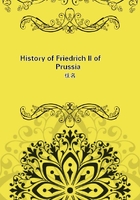
第100章
Mr. John invents such toys, writes almanacs, practises medicine, for good reasons; his encouragement from the Holy Roman Empire and mankind being only a pension of 18 pounds a year, and that hardly ever paid. An ingenious person, truly, if there ever was one among Adam's Posterity. Just turned of fifty and ill off for cash. This glimpse of him, in his little black tent with perspective glasses, while the Thirty-Years War blazes out, is welcome as a date.
WHAT BECAME OF THE CLEVE-JULICH HERITAGE, AND OF THE PREUSSEN ONE.
In the Cleve Duchies joint government had now become more difficult than ever: but it had to be persisted in,--under mutual offences, suspicions and outbreaks hardly repressed;--no final Bargain of Settlement proving by any method possible. Treaties enough, and conferences and pleadings, manifestoings:--Could not some painful German collector of Statistics try to give us the approximate quantity of impracticable treaties, futile conferences, manifestoes correspondences; in brief, some authentical cipher (say in round millions) of idle Words spoken by official human creatures and approximately (in square miles) the extent of Law Stationery and other Paper written, first and last, about this Controversy of the Cleve Duchies? In that form it might have a momentary interest.
When the Winter-King's explosion took place, [Crowned at Prag, 4th November N.S. 1619; beaten to ruin there, and obliged to gallop (almost before dinner done), Sunday, 8th November, 1620.]
and his own unfortunate Pfalz (Palatinate) became the theatre of war (Tilly, Spinola, VERSUS Pfalzers, English, Dutch), involving all the neighboring regions, Cleve-Julich did not escape its fate.
The Spaniards and the Dutch, who had long sat in gloomy armed-truce, occupying with obstinate precaution the main Fortresses of these Julich-Cleve countries, did now straightway, their Twelve-Years' truce being out (1621), [Pauli, vi. 578-580.] fall to fighting and besieging one another there; the huge War, which proved of Thirty Years, being now all ablaze. What the country suffered in the interim may be imagined.
In 1624, in pity to all parties, some attempt at practical Division of the Territory was again made: Neuburg to have Berg and Julich, Brandenburg to have Cleve, Mark, Ravensburg and the minor appurtenances: and Treaty to that effect was got signed (11th May, 1624). But it was not well kept, nor could be; and the statistic cipher of new treaties, manifestoes, conferences, and approximate written area of Law-Paper goes on increasing.
It was not till forty-two years after, in 1666, as will be more minutely noticeable by and by, that an effective partition could be practically brought about. Nor in this state was the Lawsuit by any means ended,--as we shall wearisomely see, in times long following that. In fact there never was, in the German Chanceries or out of them, such a Lawsuit, Armed or Wigged, as this of the Cleve Duchies first and last. And the sentence was not practically given, till the Congress of Vienna (1815) in our own day gave it;and the thing Johann Sigismund had claimed legally in 1609 was actually handed over to Johann Sigismund's Descendant in the seventh generation, after two hundred and six years. Handed over to him then,--and a liberal rate of interest allowed. These litigated Duchies are now the Prussian Province Julich-Berg-Cleve, and the nucleus of Prussia's possessions in the Rhine country.
A year before Johann Sigismund's death, Albert Friedrich, the poor eclipsed Duke of Prussia, died (8th August, 1618): upon which our swift Kurfurst, not without need of his dexterities there too, got peaceable possession of Prussia;--nor has his Family lost hold of that, up to the present time. Next year (23d December, 1619), he himself closed a swift busy life (labor enough in it for him perhaps, though only an age of forty-nine); and sank to his long rest, his works following him,--unalterable thenceforth, not unfruitful some of them.
Chapter XV.
TENTH KURFURST, GEORGE WILHELM.
By far the unluckiest of these Electors, whether the most unworthy of them or not, was George Wilhelm, Tenth Elector, who now succeeded Johann Sigismund his Father. The Father's eyes had closed when this great flame was breaking out; and the Son's days were all spent amid the hot ashes and fierce blazings of it.
The position of Brandenburg during this sad Thirty-Years War was passive rather than active; distinguished only in the former way, and as far as possible from being glorious or victorious.
Never since the Hohenzollerns came to that Country had Brandenburg such a time. Difficult to have mended it; impossible to have quite avoided it;--and Kurfurst George Wilhelm was not a man so superior to all his neighbors, that he could clearly see his way in such an element. The perfect or ideal course was clear: To have frankly drawn sword for his Religion and his Rights, so soon as the battle fairly opened; and to have fought for these same, till he got either them or died. Alas, that is easily said and written; but it is, for a George Wilhelm especially, difficult to do! His capability in all kinds was limited; his connections, with this side and that, were very intricate. Gustavus and the Winter-King were his Brothers-in-law; Gustavus wedded to his Sister, he to Winter-King's. His relations to Poland, feudal superior of Preussen, were delicate; and Gustavus was in deadly quarrel with Poland. And then Gustavus's sudden laying-hold of Pommern, which had just escaped from Wallenstein and the Kaiser?
It must be granted, poor George Wilhelm's case demanded circumspectness.